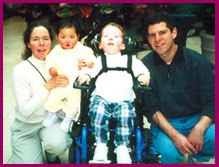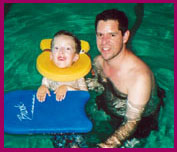
Keeping Hope Alive
by Albert Freedman
I’ll always remember the day our first child was born. “A perfect
baby!” we were told by the nurses in the maternity ward. I called our
family and friends from the hospital to share our good news.
I remember the simple congratulatory message I received from a friend a
few days after Jack’s birth. “You are now a family,” she wrote,
quite matter-of-factly.
Yes, indeed we were a family, and I’ll always remember the hope baby
Jack brought to our lives. I remember thinking about birthday parties,
ballgames, bicycle rides, and perhaps a little brother or sister, or even
two. For the first six months of Jack’s life, I pictured myself coaching
his Little League team and taking him to Phillies games. I pictured myself
watching Jack perform in his elementary school play and play in the school
jazz band just like Dad.
Those early days of parenthood were full of possibilities. Exciting
possibilities. Endless possibilities.
And then one day, the possibilities began to fall away. First, our
pediatrician told us Jack wasn’t developing normally. Then a pediatric
neurologist expressed serious concern and told us to have further testing.
Four days later, a doctor stuck pins into Jack’s little body and
studied the readings on the dials attached to the pins. Jack cried. At the
suggestion of the doctor, my wife, Anne, sat outside the examining room so
she wouldn’t have to watch her baby being stuck by those pins. I held
Jack on my lap, hoping everything would be all right.
But everything wasn’t all right. A few minutes after conducting that
EMG test, the doctor told us Jack was likely affected by a neuromuscular
disease called spinal muscular atrophy (SMA).
The doctor told us there was no treatment or cure for SMA. Jack would
be severely physically disabled, and then he would die of respiratory
complications. Babies with his type of SMA were lucky to live to age 2,
the doctor reported.
The doctor explained we would have an appointment with another
specialist later in the day to hear more about SMA and how we would care
for Jack for the next few months. He motioned to us to stay put with Jack
in the examining room.
“Take all the time you need,” the doctor said. Then he walked out
and closed the door, leaving us with each other, our baby and our
thoughts.
But the doctor didn’t leave us with any hope.
Rebuilding Hope
In a matter of minutes, Anne and I were thrust into a parenting world
light-years from where we’d started, an experience few people can even
begin to understand. If you’re reading these words, odds are you’re in
this club, too — a club none of us chose to join.
Sadly, membership in the club often demands that we check all of our
hope at the door when we first arrive. Once through the door, we find
ourselves wandering around, shocked and lost, grasping for direction. But
how can we expect to know which way to turn if we have no hope?
Somehow many of us rediscover our sense of hope, a little at a time.
And when we keep hope alive, we find ourselves feeling more positive and
better prepared to care for our affected family members.
Seven years later, I feel very fortunate to be Jack’s father, despite
the challenges my son faces. Slowly, as these years have passed, hope
somehow has returned to my vocabulary and to my heart.
But how exactly do our families reclaim and rebuild our sense of hope?
From whom do we draw hope?
Drawing Hope From Others
 |
| The Freedmans: Anne, Cara,
Jack and Al |
Shortly after Jack’s diagnosis, still reeling from shock and sadness,
I read the words of the late June Price, who at the time published a
newsletter for the SMA community. In an open letter to parents of children
with new diagnoses, June wrote:
“I was not expected to live, to work, to succeed. I was only
expected to die . . . Today, at 48, I look back and wonder how differently
my life may have been had I been given the gift of hope for a future.
Because regardless of what all the ‘experts’ predicted, I’m still
here. Parents and doctors didn’t know any better back then, but they
should now. Giving your child the hopes and dreams that go with a future
costs nothing. Not giving it can waste a lifetime.”
June’s wise words hit me between the eyes. Finding a way to be
hopeful would be doing the right thing for Jack. I will always be grateful
for June’s letter and for her friendship to our family. (June Price died
last year at age 54.)
Others, too, helped us reclaim and build our sense of hope one piece at
a time. Through organizations such as MDA, we contacted families with
similar experiences who helped us feel we weren’t alone. Jack’s home
care nurses, therapists and teachers all view him as a person worth
getting to know, and they focus on what Jack can do.
And with our move to a new community, duPont Hospital for Children in
Wilmington, Del., (home to an MDA clinic) became our primary resource for
Jack’s medical care. Even in the middle of the night during the scariest
of medical crises, the professionals at duPont Hospital somehow remain
steadfast in their hopeful approach to caring for children. We continue to
be lucky to have so many caring people in Jack’s corner.
Jack’s Hopes
When we have visitors to our home, it’s very easy for them to get
lost in the trappings of Jack’s disabling medical condition. It’s easy
to look at our son and see only his wheelchair. It’s easy to listen to
Jack and hear only his broken speech patterns and the words that can’t
be understood. Entering Jack’s bedroom, it’s hard to miss the pulse
oximeter, the feeding pump and the BiPAP breathing machine.
These are indeed things Jack needs, but these aren’t the things Jack
is focused on. These aren’t the things Jack hopes for day-to-day.
Like any other 7-year-old, Jack hopes his friends will spend time with
him. He hopes for birthday presents, family outings, holiday celebrations
and success with his schoolwork. Jack hopes for new computer games. He
hopes we’ll take him places with lots of space to zoom around in his
power wheelchair. Jack hopes his little sister will be fair and take
turns. He hopes to go swimming at the pool. And he hopes Dad will come
home from work in time to give him a bath.
So it’s Jack himself who now shows us the way, with his own sense of
hope as our inspiration. Despite the many challenges he faces every day,
Jack is a happy, motivated little boy who hopes for many of the same
things other kids hope for. And seven years following his diagnosis,
we’re indeed grateful to have Jack sharing his hopes with us.
As June Price implored us to do, Anne and I approach every day of
Jack’s life with hope for his future. We hope for understanding friends.
We hope for skilled and compassionate medical professionals, for
accommodating special educators and therapists, and for the energy to
carry on day after day with our family’s version of “normal.” We
hope for Jack’s continued health and for the day researchers will
discover a treatment or cure for SMA.
But most importantly, we hope for Jack’s happiness. We would like
Jack to continue seeing himself in a positive light.
New Rules
I’ve come to realize that membership in our “club” demands
something quite
 |
| Jack and his dad enjoy a
swim. |
different from what I experienced in those first moments — back when I
checked all my hope at the door. Seven years with my son have taught me
that it’s my job to help change those membership rules. I’ve come to
believe it’s my job to follow Jack’s lead and hope for all the good
things he hopes for.
Following a remarkable recovery from a harrowing hospitalization, one
of Jack’s critical care doctors told us, “Jack’s a fighter.”
All of us who find ourselves in this club know a fighter. But our loved
ones cannot fight without hope, so it’s up to all of us — family
members and professionals together — to keep hope alive.
| Albert Freedman, Ph.D., is a child and family psychologist
in private practice and at Delaware Valley Friends School in
Chester County, Pa. He provides consultation and training to
professionals in health care and educational settings, and
frequently speaks on the topic of caring for children with special
needs. His essay, “The Future Is Now,” is included in the
book, You Will Dream New Dreams: Inspiring Personal
Stories by Parents of Children With Disabilities
(Kensington Publishers, 2001). Freedman can be contacted at freedman@fsma.org. |
|

